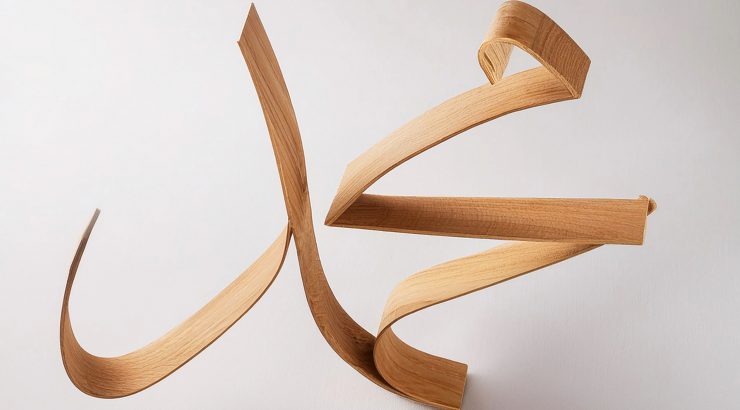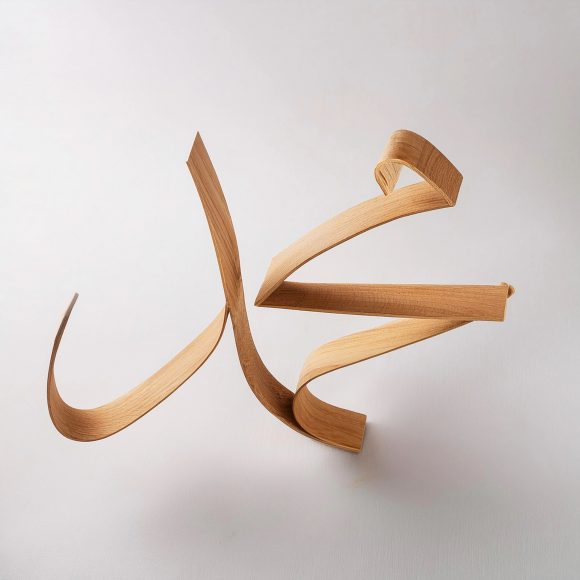You Should Know This Man Let Me Introduce You to Somebody I Love
October 21, 2024
Arabic Calligraphy with the word “Muhammad” written
In most lectures inside and outside Chapman, I take a moment to inform the listening audience, those who dare to listen, of the profound significance of the Prophet Muhammad’s life. His life embodies the Islamic dimensions, which are both internal and external, with the latter articulating the former.
The inner dimensions of Islam are six:
- Belief in God consists of God’s existence and uniqueness, and God is the only deity worthy of worship.
- Belief in God’s angels.
- Belief in God’s scriptures, like the Torah and the final revelation in Islamic theology, the Qur’an.
- Belief in God’s messengers.
- Belief in the Last Day.
- Belief in God’s divine measure (Some call it “Divine Decree”).
The outer dimensions of Islam are five: to verbally testify that there is no deity except God and that God is the only one worthy of worship; to testify that Muhammad is God’s messenger; to offer five daily devotional prayers; to pay an annual alms; to fast during the month of Ramadan, the 9th month in the Islamic calendar; and to perform pilgrimage to God’s temple, the Holy Ka’ba in the holy city of Mecca, once in a person’s lifetime.
With the amount of information available online and in print, it is surprising and slightly dismaying to find people, Muslims and Non-Muslims alike, ignorant of the above dimensions, especially about the Prophet of Islam, Muhammad (peace and blessings be upon him). I hope the below words will bring some attention to the importance of knowing this man (peace and blessings be upon him).
People often use “biography” as the Arabic equivalent of its English counterpart. The Arabic word comes from a verb meaning “to go in any manner or any pace.” Specifically, the Arabic word (seerah) has various meanings, including “a going in any manner or any pace; a way, course, rule, mode, or manner, of acting or conduct or life or the like; the record of a person’s actions and pious works; or stories of the ancients; mode, or manner, of being, state, or condition.” Thus, a study of the Prophet Muhammad (peace and blessings be upon him) is a study of him in all facets: his physical stature, character, his days as the Messenger of God, his expeditions, his journeys, and evidence that he is God’s messenger. It is not merely a historical journey but a complete and comprehensive picture of a man on which Europeans have written over 1,300 books.
In Islamic thought, there are many objectives of knowing the Prophet of Islam (peace and blessings be upon him). Among the most important objectives is to emulate his ethics and character to the best of a Muslim’s ability. For people seeking to promote positive change, he is the epitome of ways of inviting people to do all types of good. For nurturers, he presents the most beneficial methods of nurturing an individual and community. He is the (not a) personification of transformative leadership for leaders. For ascetics, he shows what genuine asceticism looks like. For businesspeople, he perfectly demonstrates the higher objectives of business dealings, its rulings, and methods of earning pure, honest, and ethical wealth. People experiencing trials and tribulations can observe the manners of patience and perseverance he demonstrated during his life. Theologians and jurists correctly understand the Qur’an, Islam’s holy scripture, by studying his life.
Learning about the Prophet Muhammad (peace and blessings be upon him) shows that he is not a lie. He is the truth sent by the Almighty to all people. The more a person reads about him, the more a person will develop an appreciation, admiration, and love for him. Muslims who dedicate a portion of their time to learning something about him demonstrate a type of worship to God, for each time a Muslim reads or sees his name, they say, “Peace and blessings be upon.” In other words, “O God, we ask you to give peace to the Prophet and bless him,” a prayer that God will answer.
Learning about the Prophet Muhammad (peace and blessings be upon him) is unique because of his accurate recorded accounts. A person knows the depth of his sincerity and truthfulness and observes the only way to human reform. A person notices how much time and energy he spent during his ministry in Mecca and his ministry and nation-building in Al-Madinah. His wives and companions have shared every morsel of his life with anyone curious about him, including his way of laughing, smiling, eating, bathing, drinking, walking, and the number of white hairs on his head and beard! He never distanced himself from anyone, neither his companions nor enemies. Instead, he engrossed himself in society, demonstrating the highest ethical behavior.
In another post, I will present the readily available and accessible resources for learning about the Prophet’s life.
Below are some English books a Muslim or Non-Muslim should consider reading.
Muhammad: An Authentic Overview of His Life and Mission by Mustafa Umar
In the Company of the Messenger by Salman Al-Odah
Muhammad: His Life Based on the Earliest Sources by Martin Lings
Muhammad: Man, and Prophet by Adil Salahi
Prophet of Mercy by Abu’l-Hasan’ Ali Nadwi
The Messenger: The Meanings of the Life of Muhammad by Tariq Ramadan
A Biography of the Prophet of Islam by Dr. Mahdi Rizqullah Ahmad
The Noble Life of the Prophet by Dr. Ali Mohammad al-Sallabi


